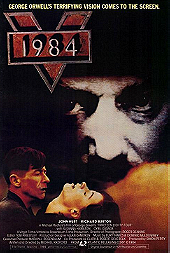George Orwell's novel of a totalitarian future society in which a man whose daily work is rewriting history tries to rebel by falling in love.
John Hurt: Winston Smith
Richard Burton: O'Brien
There's something peculiar about the film adaptations of George Orwell's celebrated dystopian novel, Nineteen Eighty-Four.
Since I read the book a while ago, I have enjoyed two film renditions of the story, Michael Anderson's 1984(1956) and now Michael Radford's very timely kept Nineteen Eighty-Four(1984).

In terms of cinematics, there is little in the ways of uniqueness. When it boils down to ideology; Both rather uninspired pieces of film-making, really lacking anything that would make them border or lower based on significant terms. However, the piece of literature upon which they are are based is so incredibly powerful that the remarkable story overshadows the films' in some ways. Indeed, considering the near-perfection of Orwell's 1949 novel, it would be detrimental and immoral to make any major changes to the plot. Thus, Michael Radford's film sort of floats through the story of Winston Smith and his rebellion against Big Brother; more out of duty rather than raw inspiration. However despite of this, it does do a decent job of it, treating Orwell's story with the respect it deserves, and so praise must be awarded to this adaptation and the former.
For years, Winston Smith (John Hurt) has endured a sordid existence in London, the capital of Airstrip One in the nation of Oceania. The year is 1984, and all citizens now operate under the strict guidelines of the Party, under the constant surveillance of the Thought Police. Day by day, it is Winston's duty, as an Outer Party member in the Ministry of Truth, to revise history in accordance with Big Brother's most recent requirements. Once a person has been erased from the official documents, he ceases to exist; indeed, he never existed. When the Party decides to cut chocolate rations from thirty grams to a mere twenty-five, it is Winston's responsibility to alter the facts: in actuality, the chocolate rations were never at thirty grams. They were at twenty, and now Big Brother has chosen to increase the rations to twenty-five grams. The enthusiastic response of Party-devoted neighbour Parsons (Gregor Fisher) to this announcement is a testament to the lethal efficiency of these continual revisions. The human memory cannot seemingly be relied upon to recall such information, and so the Party is the only trustworthy source.
Yet Winston Smith is not alone in his misgivings about the Party. He eventually strikes up a romantic relationship with a mysterious young woman named Julia (Suzanna Hamilton), and the two meet regularly to satisfy their desires for each other, in doing so rebelling against the strict rules enforced by the Thought Police. Smith decides to place his trust in an Inner-Party member named O'Brien (Richard Burton in his last screen role), but this turns out to be a sting operation, and both Smith and Julia are subsequently arrested and taken to the Ministry of Love to be rehabilitated. Via numerous grueling means of torture, O'Brien sets about destroying every last hint of Smith's rebellion, delaying his inevitable execution until he not only obeys Big Brother but also loves him. The treatment doesn't allow for rebels to make martyrs of themselves, since dissenters are only murdered once they have been twisted back into perfect citizens; until they will wholeheartedly agree that, if the Party says so, then 2 + 2 = 5.
Though there are a few images that will surely stay in my memory for a long time (those shots with the rats in the contraption will certainly cause alarm), Nineteen Eighty-Four curiously lacks the unique visual style of many of the decade's other dystopian sci-fi classics; such as Ridley Scott's Blade Runner(1982) and Terry Gilliam's Brazil(1985) {which is probably the greatest Orwell-inspired film you're ever likely to see}.
The film was shot in London around the precise time in which the original novel is set, but the setting seemed to recall Britain in the early 1940s, a historic city that has been torn apart by the constant onslaught of the enemy's aerial attacks. Though he had initially toyed about with the idea of filming in black-and-white, cinematographer Roger Deakins used a film processing technique called Bleach bypass to create the film's washed-out colour visuals. The most engaging sequences undoubtedly involve Burton and Hurt during the torture sessions, which are almost painful to watch. Winston Smith is reduced to such a horrific mess of a man that you really do despair when O'Brien declares him to be the final person of his kind. I also liked the idea of Smith regularly slipping into his hallucination of the flowing green fields, and that gutting moment when even this sanctuary is infiltrated by Big Brother and his all-powerful totalitarian regime.
''If you want a vision of the future, Winston, imagine a boot stamping on a human face forever.''
10/10
 Login
Login